#english noblewomen
Text

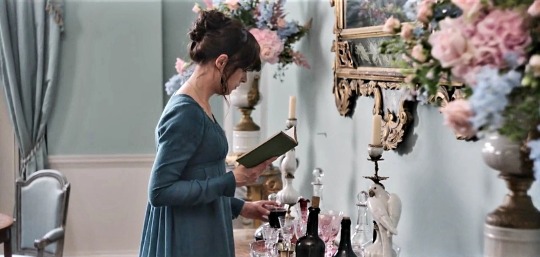



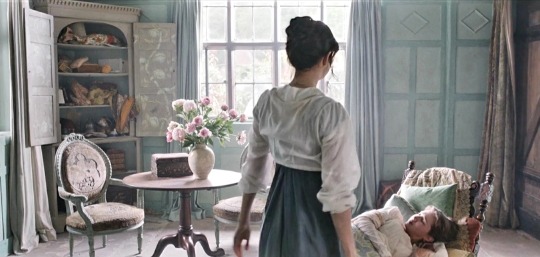

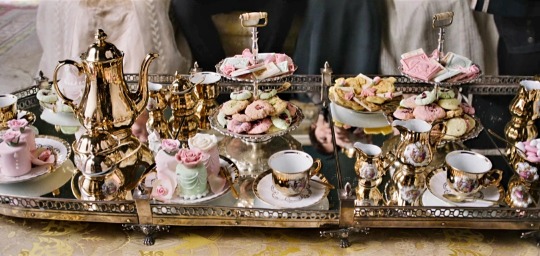
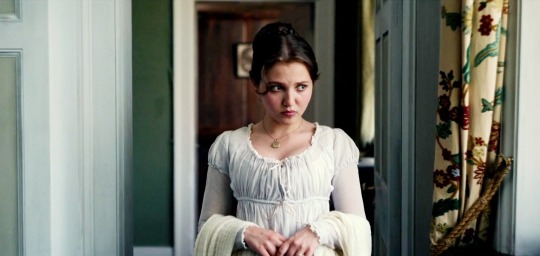
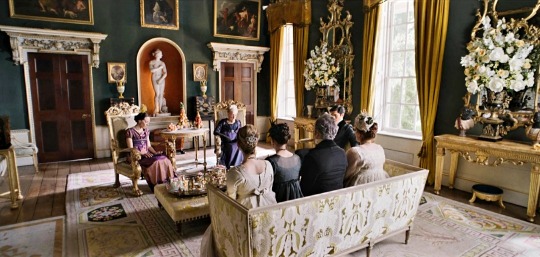
PERSUASION (2022)
#persuasion#filmedit#perioddramaedit#jane austen#persuasion 2022#anne elliot#female directors#period drama#costumedit#1800s fashion#noblewomen#english nobility#female directed movies#netflixedit#weloveperioddrama#anne x frederick#anne x wentworth#dakota johnson#period costume#old fashioned#early 1800s#nobility#my edit#interior design#luxury#movie aesthetic#mary elliot
360 notes
·
View notes
Text
Modern AU Altaïr would show Maria all the cute kittens videos on IG to try to convince her to get a cat instead of a dog.

As if she didn't already own a pug.

Altaïr isn't the biggest fan of her pooch, because why of all dogs in the world it has to be the one that is drooling a lot?
#shitpost#assassin's creed#so many assassins#gaming#altaïr ibn la'ahad#maria thorpe#altmar#altaïr#ac1#modern AU#roommates AU#Maria has a pug#his name is garlik#and he's a good boy#name taken from the 1126 names long list of potential dog names by Edward 2nd duke of York#it's from the 15th century but idgaf#pugs ancestors were a must gave for English noblewomen#so that's why I picked pug
12 notes
·
View notes
Text
So here's one of the coolest things that has happened to me as a Tolkien nut and an amateur medievalist. It's also impacted my view of the way Tolkien writes women.
Here's Carl Stephenson in MEDIEVAL FEUDALISM, explaining the roots of the ceremony of knighthood:
"In the second century after Christ the Roman historian Tacitus wrote an essay which he called Germania, and which has remained justly famous. He declares that the Germans, though divided into numerous tribes, constitute a single people characterised by common traits and a common mode of life. The typical German is a warrior. [...] Except when armed, they perform no business, either private or public. But it is not their custom that any one should assume arms without the formal approval of the tribe. Before the assembly the youth receives a shield and spear from his father, some other relative, or one of the chief men, and this gift corresponds to the toga virilis among the Romans--making him a citizen rather than a member of a household" (pp 2-3).
Got it?
Remember how Tolkien was a medievalist who based his Rohirrim on Anglo-Saxon England, which came from those Germanic tribes Tacitus was talking about?
Stephenson argues that the customs described by Tacitus continued into the early middle ages eventually giving rise to the medieval feudal system. One of these customs was the gift of arms, which transformed into the ceremony of knighthood:
"Tacitus, it will be remembered, describes the ancient German custom by which a youth was presented with a shield and a spear to mark his attainment of man's estate. What seems to the be same ceremony reappears under the Carolingians. In 791, we are told, Charlemagne caused Prince Louis to be girded with a sword in celebration of his adolescence; and forty-seven years later Louis in turn decorated his fifteen-year-old son Charles "with the arms of manhood, i.e., a sword." Here, obviously, we may see the origin of the later adoubement, which long remained a formal investiture with arms, or with some one of them as a symbol. Thus the Bayeux Tapestry represents the knighting of Earl Harold by William of Normandy under the legend: Hic Willelmus dedit Haroldo arma (Here William gave arms to Harold). [...] Scores of other examples are to be found in the French chronicles and chansons de geste, which, despite much variation of detail, agree on the essentials. And whatever the derivation of the words, the English expression "dubbing to knighthood" must have been closely related to the French adoubement" (pp 47-48.)
In its simplest form, according to Stephenson, the ceremony of knighthood included "at most the presentation of a sword, a few words of admonition, and the accolade."
OK. So what does this have to do with Tolkien and his women? AHAHAHAHA I AM SO GLAD YOU ASKED. First of all, let's agree that Tolkien, a medievalist, undoubtedly was aware of all the above. Second, turn with me in your copy of The Lord of the Rings to chapter 6 of The Two Towers, "The King of the Golden Hall", when Theoden and his councillors agree that Eowyn should lead the people while the men are away at war. (This, of course, was something that medieval noblewomen regularly did: one small example is an 1178 letter from a Hospitaller knight serving in the Latin kingdom of Jerusalem which records that before marching out to the battle of Montgisard, "We put the defence of the Tower of David and the whole city in the hands of our women".) But in The Lord of the Rings, there's a little ceremony.
"'Let her be as lord to the Eorlingas, while we are gone.'
'It shall be so,' said Theoden. 'Let the heralds announce to the folk that the Lady Eowyn will lead them!'
Then the king sat upon a seat before his doors and Eowyn knelt before him and received from him a sword and a fair corselet."
I YELLED when I realised what I was reading right there. You see, the king doesn't just have the heralds announce that Eowyn is in charge. He gives her weapons.
Theoden makes Eowyn a knight of the Riddermark.
Not only that, but I think this is a huge deal for several reasons. That is, Tolkien knew what he was doing here.
From my reading in medieval history, I'm aware of women choosing to fight and bear arms, as well as becoming military leaders while the men are away at some war or as prisoners. What I haven't seen is women actually receiving knighthood. Anyone could fight as a knight if they could afford the (very pricy) horse and armour, and anyone could lead a nation as long as they were accepted by the leaders. But you just don't see women getting knighted like this.
Tolkien therefore chose to write a medieval-coded society, Rohan, where women arguably had greater equality with men than they did in actual medieval societies.
I think that should tell us something about who Tolkien was as a person and how he viewed women - perhaps he didn't write them with equal parity to men (there are undeniably more prominent male characters in The Lord of the Rings and The Hobbit, at least, than female) but compared to the medieval societies that were his life's work, and arguably even compared to the society he lived in, he was remarkably egalitarian.
I think it should also tell us something about the craft of writing fantasy.
No, you don't have to include gut wrenching misogyny and violence against women in order to write "realistic" medieval-inspired fantasy.
Tolkien's fantasy worlds are DEEPLY informed by medieval history to an extent most laypeople will never fully appreciate. The attitudes, the language, the ABSOLUTELY FLAWLESS use of medieval military tactics...heck, even just the way that people travel long distances on foot...all of it is brilliantly medieval.
The fact that Theoden bestows arms on Eowyn is just one tiny detail that is deeply rooted in medieval history. Even though he's giving those arms to a woman in a fantasy land full of elves and hobbits and wizards, it's still a wonderfully historically accurate detail.
Of course, I've ranted before about how misogyny and sexism wasn't actually as bad in medieval times as a lot of people today think. But from the way SOME fantasy authors talk, you'd think that historical accuracy will disappear in a puff of smoke if every woman in the dragon-infested fantasy land isn't being traumatised on the regular.
Tolkien did better. Be like Tolkien.
#tolkien#middle earth#jrr tolkien#lord of the rings#lotr#the lord of the rings#eowyn#writing fantasy#fantasy#female characters#writing#historical fiction#medieval women#medieval history#medieval#history#womens history
8K notes
·
View notes
Text


The meaning behind my username. 😊
#milady#english#word definition#dictionary#wordsnquotes#words#definitions#education#understanding#noblewomen#my name#name meanings#amethyst#gemstone#quartz
1 note
·
View note
Note
Inspired by your last ask! What are the best French books you’ve read that have no English translation yet? I read Play Boy and Qui a tué mon père (really loved the latter) last year and it feels so fun to read something that other Americans can’t access yet
I'm too nervous to make any list of the Best XYZ Books because I don't want to raise your expectations too high! But okay, here's my No English Translation-themed list of books I've enjoyed in recent years. I tried to make it eclectic in terms of genre as I don't know what you prefer :)
Biographies
• Le dernier inventeur, Héloïse Guay de Bellissen: I just love prehistory and unusual narrators so I enjoyed this one; it's about the kids who discovered the cave of Lascaux, and some of the narration is written from the perspective of the cave <3 I posted a little excerpt here (in English).
• Ces femmes du Grand Siècle, Juliette Benzoni: Just a fun collection of portraits of notable noblewomen during the reign of Louis XIV, I really liked it. For people who like the 17th century. I think it was Emil Cioran who said his favourite historical periods were the Stone Age and the 17th century but tragically the age of salons led to the Reign of Terror and Prehistory led to History.
• La Comtesse Greffulhe, Laure Hillerin: I've mentioned this one before, it's about the fascinating Belle Époque French socialite who was (among other things) the inspiration for Proust's Duchess of Guermantes. I initially picked it up because I will read anything that's even vaguely about Proust but it was also a nice aperçu of the Belle Époque which I didn't know much about.
• Nous les filles, Marie Rouanet: I've also recommended this one before but it's such a sweet little viennoiserie of a book. The author talks about her 1950s childhood in a town in the South of France in the most detailed, colourful, earnest way—she mentions everything, describes all the daft little games children invent like she wants ageless aliens to grasp the concept of human childhood, it's great.
I'll add Trésors d'enfance by Christian SIgnol and La Maison by Madeleine Chapsal which are slightly less great but also sweet short nostalgic books about childhood that I enjoyed.
Fantasy
• Mers mortes, Aurélie Wellenstein: I read this one last year and I found the characters a bit underwhelming / underexplored but I always enjoy SFF books that do interesting things with oceans (like Solaris with its sentient ocean-planet), so I liked the atmosphere here, with the characters trying to navigate a ghost ship in ghost seas...
• Janua Vera, Jean-Philippe Jaworski: Not much to say about it other than they're short stories set in a mediaeval fantasy world and no part of this description is usually my cup of tea, but I really enjoyed this read!
Essays / literary criticism / philosophy
• Eloge du temps perdu, Frank Lanot: I thought this was going to be about idleness, as the title suggests, and I love books about idleness. But it's actually a collection of short essays about (French) literature and some of them made me appreciate new things about authors and books I thought I knew by heart, so I enjoyed it
• Le Pont flottant des rêves, Corinne Atlan: Poetic musings about translation <3 that's all
• Sisyphe est une femme, Geneviève Brisac: Reflections about the works of female writers (Natalia Ginzburg, Virginia Woolf, Sylvia Townsend Warner, etc) that systematically made me want to go read the author in question, even when I'd already read & disliked said author. That's how you know it's good literary criticism
Let's add L'Esprit de solitude by Jacqueline Kelen which as the title suggests, ponders the notion of solitude, and Le Roman du monde by Henri Peña-Ruiz which was so lovely to read in terms of literary style I don't even care what it was about (it's philosophy of foundational myths & stories) (probably difficult to read if you're not fully fluent in French though)
Did not fit in the above categories:
• Entre deux mondes by Olivier Norek—it's been translated in half a dozen languages, I was surprised to find no English translation! It's a crime novel and a pretty bleak read on account of the setting (the Calais migrant camp) but I'd recommend it
• Saga, Tonino Benacquista: Also seems to have been translated in a whole bunch of languages but not English? :( I read it ages ago but I remember it as a really fun read. It's a group of loser screenwriters who get hired to write a TV series, their budget is 15 francs and a stale croissant and it's going to air at 4am so they can do whatever they want seeing as no one will watch it. So they start writing this intentionally ridiculous unhinged show, and of course it acquires Devoted Fans
Books that I didn't think existed in English translation but they do! but you can still read them in French if you want
• Scrabble: A Chadian Childhood, Michaël Ferrier: What it says on the tin! It's a short and well-written account of the author's childhood in Chad just before the civil war. I read it a few days ago and it was a good read, but then again I just love bittersweet stories of childhood
• On the Line, Joseph Ponthus: A short diary-like account of the author's assembly line work in a fish factory. I liked the contrast between the robotic aspect of the job and the poetic nature of the text; how the author used free verse / repetition / scansion to give a very immediate sense of the monotony and rhythm of his work (I don't know if it's good in English)
• The End of Eddy, Edouard Louis: The memoir of a gay man growing up in a poor industrial town in Northern France—pretty brutal but really good
• And There Was Light, Jacques Lusseyran: Yet another memoir sorry, I love people's lives! Jacques Lusseyran lost his sight as a child, and was in the Resistance during WWII despite being blind. It's a great story, both for the historical aspects and for the descriptions of how the author experiences his blindness
• The Adversary: A True Story of Monstrous Deception, Emmanuel Carrère: an account of the Jean-Claude Romand case—a French man who murdered his whole family to avoid being discovered as a fraud, after spending his entire adult life pretending to be a doctor working at the WHO and fooling everyone he knew. Just morbidly fascinating, if you like true crime stuff
#ask#book recs#the book i started reading last night is The Naked Neanderthal by Ludovic Slimak and i also didn't#expect it to have an english translation but it does#i'm only at the beginning and so far it's philosophical ponderings about what kind of creature the neanderthals were#if they were humans in a different way than us. with a different kind of intelligence#and how to understand it without projecting our own way of being in the world onto this other humanity#sorry to quote cioran again but it reminds me of when he said every generation misses the good old days and#if we retrace our steps from regret to regret we'll find the original regret#our nostalgia for a time when humans weren't yet human
202 notes
·
View notes
Text
Golden and Silver, my new colors | part three



But who thought of the damage done to you? Who thought of the negligence directed at your situation? Who thought of your loneliness? Why should you alone carry the responsibility of keeping things the way they are?
∴pairing: Aemond Targaryen x Wife!reader
∴warnings and a note: slight angst, pregnancy, some reader’s thoughts may be a little aggressive to the topic of pregnancy, spiteful reader, english is not my first language. There's a bit of book!aemond here.
golden and silver masterlist
There weren't many activities for noblewomen to do in King's Landing, or even any entertainment. It all boiled down to reading and sewing lessons, walks in the garden and listening to the gossip of the other court nobles. You weren't an avid admirer of the Targaryens, but you would like the privilege of having your own dragon so that you could discover the beauty hidden in the most geographically and culturally diverse corners of Westeros, and most importantly, escape the shadow of your family. Those thoughts had been recurring over the last few days, a beautiful illusion indeed, after all, what was the cost of dreaming?
Your new favorite spot was a secluded part of Aegon's river, just you, a good book and a basket of fruit, sweets and wine. Most of the next few days were spent there, with a soft towel under your body and the comforting sound of the lapping waves — and the masterful sunset. It was a good refuge, a good hiding place. A good place to stay inert and away from certain people. However, the dichotomy of that feeling was curious, as even as you contemplated the calm and peace of being under the radar, there was a burning desire to savor every stage of rancor, a spark in your vein to demonstrate your dissatisfaction, loathing and anger. In secret corners of your mind the nature of such sensations was frightening, especially putting them into practice.
The damage could be irreversible.
But who thought of the damage done to you? Who thought of the negligence directed at your situation? Who thought of your loneliness? Why should you alone carry the responsibility of keeping things the way they are?
Fuck the damage.
Your steps were heavy as he mulled over those memories. Memories of your absent husband, your parents delighted with the position they'd gained at your expense (but indifferent to your failed marriage), and the Queen trying to maintain your unwavering faith in Aemond's change. Everyone will have an answer.
Upon arriving in the chambers shared with Aemond, your eyes noted with surprise the presence of Talya, Queen Alicent's personal servant, near the door.
"My lady, the queen demands your presence in her chambers."
The rude eye-rolling action was almost done by you, nodding silently and allowing yourself to be guided up the stairs beyond Maegor's holdfast. The Queen's Royal Protector, Sir Criston Cole, bowed briefly to your arrival before being announced inside the family room.
“My dear, how are you?” Alicent inquired, but she wasn't the only one in the room.
“Fine”, you replied simply.
“I was worried about that dinner situation, but I hope whatever happened is a ghost from the past.” The lack of response forced the queen to proceed. “I have been reflecting on your safety and I thought a personal guard would be necessary, especially in your condition,” she said, “this is Sir Koren Fowler, he will be your sworn protector from now on.”
Looking closely at the tall, robust, fair-skinned, brown-haired, brown-eyed man, there was nothing that bothered you about the matter. It was common for people of your position to have formidable personal guards, however the thought of having someone at your side every moment of the day was a little uncomfortable, especially in your moments alone. But it wasn't all bad, not when Koren of the Fowler house was almost... pretty. Almost? No, definitely.
"I understand. Sir Koren,” you bowed.
"My lady."
“My queen,” you said, “if that is all, I would like to retire now.”
Your behavior triggered a flea in Alicent's ear. That was the first time in months that you didn't want her help in your marriage. Perhaps it was the positive effect of the dialogue with Aemond the nights before. Perhaps good fruits could be reaped at the end of it all, despite its almost kilometric internal distance.
If she only knew...
“That's all, dear,” she said simply, gesturing to the man in the room.
You didn't speak to your new protector during the ride, or afterward, really caring little about the new change in your routine. Perhaps he went unnoticed most of the time, you thought, or you could use his authority to keep him away, as Prince Aegon did with Sir Arryk. Requesting a bath from your maid, you lay down on the bed as the last remnants of light disappeared from the sky, resting your right hand on your belly. A lump formed in your throat as your body went cold with fear. Would you be able to love him? How could you love him with so much resentment in your heart?
How could I love him if I'm so scared?
A child should represent happiness, the greatest gesture a lady could do for her husband — especially if it's a son. But you didn't feel any of that. No joy or satisfaction. You didn't want to die giving birth to the child of a man who didn't deserve your respect. The same man that entered your chambers a few seconds ago and was not noticed by you. Aemond watched your figure closely, wondering what was going on in his head. He had a bouquet in hand, your favorite according to his mother, the flower was composed of four completely red petals and one with a whitish center and a red outer face. Suddenly he thought of how he should address you. The word wife still sounded strange when said aloud, so he spoke to you by name, as he never had before.
“I brought them for you,” he said when your misty gaze met his before drifting to the ceiling again.
He wasn't the only one who had difficulty saying certain words, as any thanks seemed impossible for you to utter. He took a deep breath, looking at the front of the bed.
"Hope you enjoy it."
No answer was given.
"How are you?" He tried.
“Fine,” you said.
“Good.”
His steps were slow, almost fearful, his expression serious as he sat beside your prone body. Who was he kidding? He would rather deal with a thousand soldiers and swords than confront his feelings, than give in to your mercy.
“I know we didn't start off ideally. But I hope you might reconsider a second try,” he said, his voice barely audible.
Your gaze lingered on his. Funny how things are. If this were said a few weeks ago you would happily accept it, heart alight and warm as you cup his face and dare a passionate kiss on your husband's soft lips. But now, now… it's everything you don't want. You don't just want his repentance, you want to subject him to the punishment that fits him.
"Good for you."
"What do you mean?"
"Good. For you. That's exactly what I mean.”
“And what is that supposed to mean?”
“That I don't care what you think must happen, not anymore,” you said, moving to sit up and facing him firmly. “You've had enough time to be a decent husband, or at least try. Why should I believe that now would be any different?”
“You're pregnant,” he anticipated, “That should be enough to change things.”
“What if I wasn't? If I wasn't pregnant? Would you be here with my favorite flowers trying to fix what you've done without even apologizing? Or would you just remain immersed in your own navel without caring?”
The bitterness in your features was enough to make his jaw tighten, making him reflect a little.
"Is that what you want? Apologies?" He asked.
"No. I want nothing from you,” you said, “not a drop of longing for you is left in my body. But if you want to apologize, do it because you're sorry, not because your mother expected you to."
Nothing was said after that, just violent eye contact before you left him to move to your shower. Very attentive to the reality around you, you stopped Sir Koren's steps before he could follow you like a guard dog (which was his job).
"You don't have to come after me, I'll be fine."
"My la-"
"This is an order."
Aemond wasn't in the room when you got back, which wasn't a bad thing. You didn't talk to him before going to sleep, uncomfortable enough with the body next to you in the bed, obstinate in finishing the construction of your own wall forged of hatred to keep your husband away. Maybe it was enough to keep him away, you thought, but that night he watched you intently until you fell asleep, not bothering to look anywhere but your covered silhouette. And no, he wasn't limited to eye contact just at that moment. In the next few days when they were together on any occasion, however short, the one-eye prince would spend long moments staring at you. Your cutting words constantly haunted him in the activities he carried out throughout the day, with no room for respite. Aemond was unsuccessful in erasing your sharp posture from his mind. His beautiful wife. So beautiful. So…
How could he define? What did you mean to him? Why was it only after your outburst that he thought of the word wife more often?
Over the next few days you kept yourself even more distant, both physically and emotionally. Not just his, but everyone's except Sir Koren Fowler. He stayed a few feet away from where you were sitting, every day, without saying a word, without breathing in the slightest so as not to interrupt his reading. Must be frustrating, no? Being a renowned knight with accumulated victories and being confined to that style.
“I'm sorry you have to stay here,” you said, looking up from your book to find it over your shoulder.
“It’s not a trouble, my lady,” he said in his stoic posture.
“Do you like being here?”
“It's a nice place.”
“That's not what I asked.”
He took a deep breath. “It’s my duty.”
"And you like? Because wouldn't I.”
"It’s an honor to serve the king's family."
“It must be an honor to serve the King and the Queen. The Princes too, but not me. I'm just normal, I guess. There must be more interesting things to do.”
He did not answer. You didn't bother to continue that conversation either. That day after returning from the garden you went to meet the craftswoman and Irma, without telling them, just to check. It was a good surprise to see that one model was already ready and the second one was in progress. A satisfied smile left your face as your ran a hand over the glamorous fabric, worthy of the most beautiful queen in existence. And it was yours, yours alone.
“The jewels will take a while to finish, my lady.”
“Don't worry, I know. I have other pieces that will match the model,” you said.
"Are you going to wear it to Princess Rhaenyra's reception ball?" Irma asked.
"Definitely."
“… my lady, when you said you would donate your other dresses… was it true?” She asked.
You smiled. "Yes, it was."
The fair-skinned, red-haired young woman perked up, her eyes more smiling than her open smile. “If… if you don't dare,” she whispered so that madam Layla wouldn't hear, “could I have one of them? One of the black ones with blue details.”
You don't know why your breath hitched in reluctance, or why it felt wrong to part with it. You despised him, didn't you? And despised everything he stood for.
"Of couse. I have others of the same model.”
taglist: @immyowndefender @arcielee @malfoytargaryen @drinking-tea-and-be-obsessed @fan-goddess @dark-night-sky-99 @siriusdumblittlepuppy @let-love-bleeds-red @sassysaxsolo @cicaspair418 @yentroucnagol @mefools @risefallrise @auratiqs @glitterandgoldfinds @bellaisasleep @plzletmedaydream @padfooteyes @bellameshipper @zillahvathek @schniiipsel @little-duck @dc-marvel-girl96 @nina2697 @kaemond-zafiro @the-hufflebird-girl @panagiasikelia
#prince aemond targaryen#aemond#aemond targaryen#aemond x reader#reader#aemond one eye#aemond targaryen x reader#aemond targaryen x you#aemond x you#aemond the kinslayer#hotd#fanfiction#fanfic
613 notes
·
View notes
Text
Invented a new bit with my wife of like honorable old English gentlemen hanging out with OMG so 2006 valley girls having delicacy cheese and wine together and a mirror bit of respectable old noblewomen demanding Miller Lite and Wendy’s of the pseudojock fratbros who court them
127 notes
·
View notes
Text
Egyptian pharaoh names but I’ve turned them into ancient cat names
1. Tutankhbastet (Tutankhamun)
This is the most obvious name on this list because literally all I’ve done is change out the name of one god for another god. I’m not doing that for any of the others I promise.
King Tutankhamun is the one pharaoh everybody knows about, which is ironic since his birth name literally means “the living (ankh) image (tut) of the Hidden One (Amun).” (“Tut” can also be translated as “likeness” or “statue.”)
Amun was the Egyptian god of, uh… stuff (he’s hidden. His whole deal is that he’s hidden). Bastet was the Egyptian cat goddess. Sometimes she was portrayed as a lady with a cat head, but sometimes she was just a cat. If you switch Amun’s name out for Bastet’s, it becomes “the living (ankh) image (tut) of the Cat Goddess (Bastet).” Truly, a name that only the most dignified and elegant cats deserve.

Transliteration: twt-anx-bAstt
You could also say it “Tutankhbast” if you prefer.
2. Hatmiushepsyu (Hatshepsut)
Hatshepsut’s name means “the foremost (hat) of noblewomen (shepsut),” and it turned out to be really good name for her, since she became pharaoh and all. If you want to change it to “foremost of noble cats” it becomes Hat-miu-shepsyu, “miu” meaning “cats” and shepsyu meaning “noble.”

Transliteration: HAt-miww-Spsyw
3. Nedjestiti (Nefertiti)
I am aware that calling Nefertiti a pharaoh is controversial since there’s a chance that Neferneferuaten might have been her daughter and not her. But finding names of pharaohs that you can do this to and are also popular enough to be recognized is hard so shush.
Nefertiti was supposedly the most beautiful woman in the ancient world (although we can’t confirm that because Nefertiti and all the other ancient women are now dead). Her name fits this, because it means “the beautiful one (nefert) has come (iti).”
“Nedjes” is a word meaning “small,” so changing the name to Nedjest-iti makes it mean “the small one has come.”
This is a good name, because if your cat is bad then you can use it in a derogatory sense to call them a penniless little beggar. Unfortunately, it only really works for girl cats, because the masculine version is “Nedjesiu,” which loses the pun quite a bit.

Transliteration: nDst-ii.ti
4. Miumer (Narmer)
Narmer was the first pharaoh to rule over all of Egypt, and like other early pharaohs the only name used for himself was his Horus name instead of his throne name or birth name. (You know that TS Elliot poem about how cats have a bunch of different types of names? Pharaohs are like that too). Because Narmer was his Horus name, it was written inside an enclosure called a serekh instead of a cartouche.
The name itself means something like “striking (mer) catfish (nar)” or “fierce (mer) catfish (nar).” To change it to “striking cat” or “fierce cat,” you need to change nar to miu: Miu-mer. (Yeah the English translations of this one are stronger wordplay than the Egyptian versions, sorry.)
If your cat is a girl then the name should be Miutmer instead.

Transliteration: miw-mr
5. Bitokris (Netiqerti/“Nitokris”)
Queen Nitokris was either a cunning murderess, whose name lurks in the shadows of history… or she was a 3,000 year old transcription error. The only potential record we have of her name in hieroglyphs is the name of a pharaoh called “Netiqerti” on the Turin kings list. This could be Nitokris, or it could be a mistake made by a scribe while trying to copy the name of the name of another, completely different pharaoh.
If Netiqerti is Nitokris, then her name means “Neith (Net, a goddess) is excellent (iqerti).” Bit-iqerti/Bitokris would mean “honey (bit) is excellent (iqerti).”

Transliteration: bit-iqr.ti
#Ancient egypt#egyptology#ancient languages#This list ending up having more girl pharaohs than boy pharaohs on it which is neat (even if one of them probably wasn’t real)#A lot of the famous names of male pharaohs I first thought of using are things like ‘the justice of Ra is strong’ ‘Thoth is born’#Or some other combination of god name + religious meaning#And just switching another god out for Bastet gets very repetitive so I was only willing to put one version of that on this list#And the king Tut one works the best because Tut and Bastet are both well known enough that some non-nerds will probably be able to get it#Also because ‘The living image of Bastet’ is just a great name for a cat#The Nitokris one also follows that format but I was able to think of something that wasn’t just another god without completely changing it#And I’m so proud of myself for thinking of that. Bitokris is a great name.#I put this list in order of which of the pharaohs on it are most well known. If it was in order of the best names Bitokris would be first#and Tutankhbastet would be second#Ava has thoughts#Id in alt#ancient egypt stuff#Long post
72 notes
·
View notes
Text

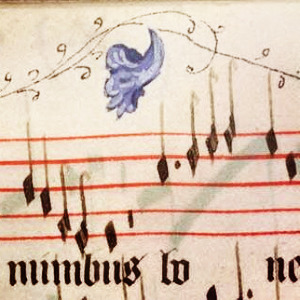
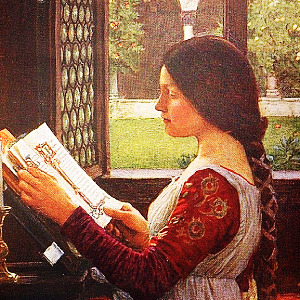

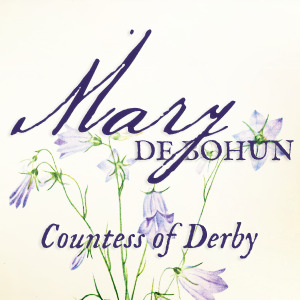
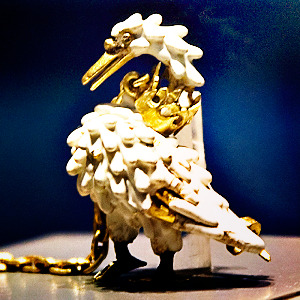


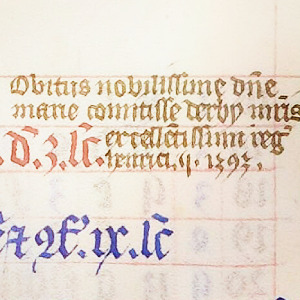
Mary de Bohun, Countess of Derby
Mary de Bohun was probably born around 22 December 1370 to Humphrey de Bohun and Joan Fitzalan, Earl and Countess of Hereford. As her father had no son, she and her elder sister, Eleanor, became the heiresses of his wealthy earldom. Eleanor married Thomas of Woodstock, the youngest son of Edward III, and according to Froissart, Woodstock intended Mary to enter a nunnery so he would inherit the entire earldom. This was not to be. In late 1380 or early 1381, Mary married John of Gaunt's son and heir, Henry Bolingbroke, the future Henry IV. The marriage appears to have happy as they shared similar interests and often spent time together. The story that Mary gave birth to a short-lived son in 1382, when she would have been only 11, is now believed to be a myth brought into being by a mistranslated text referring to her sister giving birth to a son. Mary's first child was the future Henry V, born 16 September 1386. Four more children soon followed: Thomas, Duke of Clarence (29 September 1387), John, Duke of Bedford (20 June 1389), Humphrey, Duke of Gloucester (3 October 1390) and Blanche, Electress Palatine (25 February 1392). Mary died either giving birth to her sixth and final child, Philippa, Queen of Norway, Denmark and Sweden, or from complications afterwards, on 1 July 1394, when she was only 23 years old. Mary was buried on 6 July 1394 in the Church of the Annunciation of Our Lady of the Newarke in Leicester. The church and her tomb was destroyed in the Reformation.
A little of her personality can be reconstructed. She was interested in music, playing the harp or cithara, and she bought a ruler to line parchment for musical notation, suggesting she may have also composed music.Such an interest was shared by both her husband and eldest son, one or both of whom were the 'Roy Henry' who composed two mass movements. She maintained a close contacts with other noblewomen, not only her mother and sister, but Constanza of Castile, Katherine Swynford and Margaret Bagot, suggesting that she may well have been more politically aware and involved than what is generally believed. She may have also continued the de Bohun of patronising manuscript illuminators. A number of illuminated manuscripts believed to belong to her or her sister are some of the most celebrated late medieval English manuscripts.
Mary never became Duchess of Lancaster, let alone Queen of England, but it was her family's badge of the swan that became associated with the Lancastrian kings, most famously borne by her eldest son, Henry V. One of Henry V's first acts as king was to order a copper effigy for her tomb, while in the charter of his Syon foundation, he required that the soul of "Mary … our most dear mother", among others, be prayed for in a daily divine service. Her third son, John, recorded her anniversary into his personal breviary, while her daughters may have each carried manuscripts belonging to her with them when they left England to be married. Despite the brevity of her life, Mary was remembered long after her death.
Sources: Paris, Bibliothèque Nationale, MS Lat. 17294, Chris Given-Wilson, Henry IV (Yale University Press 2017), Ian Mortimer, The Fears of Henry IV (Vintage 2008), John Matusiak, Henry V (Routledge 2012), Calendar of the Patent Rolls: Henry IV. Vol. I. A. D. 1399-1401, Calendar of Close Rolls 1381-1385, Rebecca Holdorph, 'My Well-Beloved Companion': Men, Women, Marriage and Power in the Earldom and Duchy of Lancaster, 1265-1399, University of Southampton, PhD Thesis, Marina Vidas, The Cophenhagen Bohun Hours: Women, Representation and Reception in Fourteenth Century England (Museum Tusculanum Press 2019)
79 notes
·
View notes
Text
The fame and notoriety of "learned women" of the Middle Ages and the early Renaissance attest to their rarity—with a few exceptions, they were noted more for existing at all than for their accomplishments. Up to the 17th century, learned women are extremely rare. We can identify perhaps thirty learned nuns in the period up to 1400, and some of the most accomplished of these, such as Hildegard of Bingen and Mechthild of Magdeburg, were unable to write in Latin. In the period 1350-1530, which is regarded by historians as a time when learned women are particularly numerous, a leading scholar on the subject, Margaret King, has identified no more than thirty-five such women in Italy. The medievalist Roland Bainton, in his three-volume work on women of the Reformation in Europe, adds no more than ten names of learned women to those mentioned by King. One can safely say that up to 1700 there are fewer than 300 learned women in Western Europe known to historians.
We have seen that during the Middle Ages only women wealthy enough to afford the necessary dowry to enter a convent or those who were members of ruling families had access to education. Margaret King has found that all of the learned women of the Italian Renaissance came from wealthy families. With urbanization, from the 13th century onward we find small numbers of women from middle-class families among the educated. Until the end of the 16th century the generalization that, for women, education is a class privilege holds unchallenged. A law promulgated by King Henry VIII of England illustrates this dramatically. It "prohibited all women other than gentle- and noble-women together with artificers, journeymen, husbandmen, labourers and serving men. . . from reading the Bible in English either in private or to others." While the purpose of the legislation was probably to discourage the spread of radical sectarianism, the fact that all women except noblewomen are classed with lower-class men shows how class is defined differently for women than for men.
Another generalization that can be made about these learned women is that they were mostly single, frequently cloistered or sequestered from society, or widowed. There is a general pattern of intellectual precociousness, which was encouraged in their youth, but severely discouraged later in life. Several of these women were forced into early marriages by their families and, inevitably, their intellectual life ceased with marriage. Others resisted such pressure by entering convents. Only a very few were able to resume their studies after raising families or upon widowhood. They were forced to choose between the life of a woman or the life of the mind. There was no accepted role for a woman to lead a "normal" woman's life and also to think. What the cost of such narrow choices was for individual women we can see in considering several concrete examples. What the cost was to society in general through the loss of talent and intellectual work of half the population cannot be estimated. But we might well ponder the fact that it was not until the first decades of the 20th century that in the United States and several other industrialized nations there existed the possibility for women to combine a sexual and reproductive life with the life of the intellect. To this day such choices do not exist for most women in the underdeveloped world.
-Gerda Lerner, The Creation of Feminist Consciousness
22 notes
·
View notes
Text
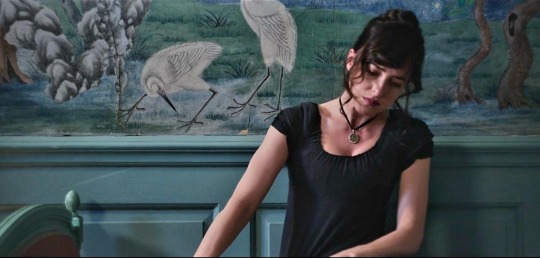


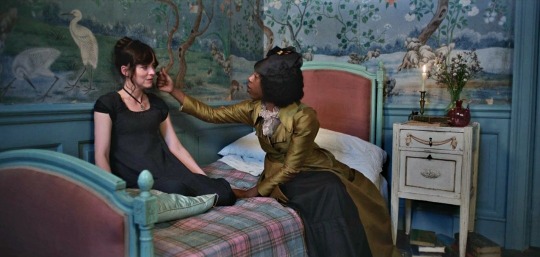
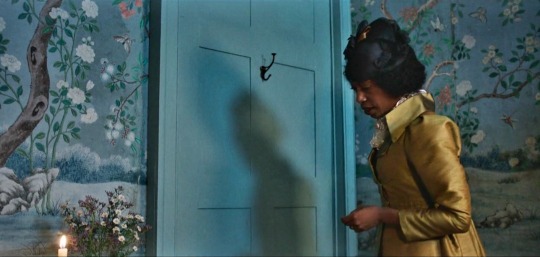

Anne's bedroom (Persuasion 2022)
#persuasion#anne elliot#perioddramaedit#luxury#interiors design#persuasion 2022#filmedit#dakota johnson#jane austen#palaces#1800s#english nobility#period drama#noblewomen#movie aesthetic#interiors#interior design#aesthetic#british nobility#1800s fashion#old fashioned#my edit
237 notes
·
View notes
Text
This doesn't seem to be reflected in the English localization but the way Panette speaks is...fucking weird? She'll end sentences with -de gozaimasu desu, which is a combination I've never heard in all my weebhood. As far as I understand grammar (admittedly not my strongest suit), if you've got -de gozaimasu you don't need -desu; they're different conjugations of the same verb.
It reminds me of when you're learning proper Japanese and you slap -desu everywhere because you're terrified of being rude.
(I blurted out いいえです once and got the most "bless your heart, at least you're trying" look lmfao)
It could very well be that her speech pattern is totally precedented in the typical "nobody in real life speaks like this but when it comes to cartoons--" way; I had never run into Kolulu's -de gonsu construction before Granblue, either.
I think, though, that she might just...speak kind of badly.
You know how I was mulling last night over how her desperate need to present herself like a noble verbally doesn't match the goth clown aesthetic? It would make way more sense if, just like with how her appearance doesn't gel with the noble image she wants to impart, her speech was not actual authentic keigo either.
It makes her gag have a consistent throughline. Visually, she understands that noblewomen wear dresses--but she wears a goth dress because she doesn't know the actual fashion, and in text, she understands that noblewomen use -desu--but doesn't fully understand how to correctly use it. She's trying, but blatantly not fitting in. Same gag as Charlotte.
There's also a bit in her Saphir C support where Saphir goes "you're going to teach me fanciness?" with special emphasis on the you, as if it were obvious to all characters in-universe that Panette is a terrible candidate for teaching this.
Her "fancy voice" grammar is perfectly fine in English, though, which--
--wait. Wait, is this what they were trying to cue with her calling Timerra "boss?" I've been wondering about that, because she calls her a very normal hime-sama/princess in Japanese. "Boss" definitely doesn't fit the image she's trying to present. I had guessed she was doing it as a pet name to cue their closeness, but it would totally fit as an attempt to show that she doesn't really understand formality.
Underline 'attempt,' though...in English the error only shines through when she's speaking to/of Timerra, where in Japanese she consistently sounds bizarre. That's why I thought it was a pet name rather than a purposeful error; she's plenty coherent talking to everyone else.
89 notes
·
View notes
Note
Hi! I'm trying to read up on the York princesses' early lives and I can find frustratingly few details on the same. I was specifically curious about their various childhood betrothals that ultimately never came into fruition due to the death of their father, but I can barely find anything online beyond the bare basics (essentially: the names of the people they were betrothed to). I was wondering of any specific details of all their individual betrothals survived, and if they changed across the years of their father's reign?
And in Bridget of York's case - since she's more elusive to find than her sisters - was she destined for a church path since birth? I've seen some sites claim that her grandmother Cecily Neville named her with no actual evidence beyond her piety, but I always assumed it was her parents who was more likely to have done so? Both Elizabeth Woodville and Edward IV were connected to St. Bridget and Elizabeth was also very pious.
You know a lot about this era so I hope it's okay to ask, sorry if the question seems out of the blue!
Hello! Sorry for taking so long to reply, I had to sit down and look up some things because the story of the betrothal of Edward IV's daughters is quite murky. I will talk about the betrothals that were done during Edward IV's reign because after that it's another thing entirely.
Let's talk about Bridget first. Was she destined for a church path since birth? There's no way of actually knowing this, but it's entirely possible she was. On a practical level, as the king's fifth surviving daughter, a competitive dowry to be used in a foreign marriage alliance would be hard to achieve (more about Edward IV and dowries in a second). More concrete evidence though does come from her name. I haven't found many noblewomen named Bridget in late medieval England but the one I did find, Bridget Holland (daughter of Thomas Holland 2nd Earl of Kent, Richard II's half-brother), indeed became a nun. Like Bridget of York, she seems to have been the youngest of 5-6 sisters.
Saint Bridget of Sweden was a very popular saint in England and she was especially revered by the English royal family (who since Henry V's time were patrons of a Bridgettine monastery at Sheen, Syon Abbey). Elizabeth of York and Margaret Beaufort would go on to commission the printing of a list of prayers popularly thought to have been written by St Bridget. For the Yorkists, however, St Bridget held particular importance because one of her prophecies had been used to justify Edward IV's right to rule. Cecily Neville in particular owned a copy of St Bridget's revelations which she later bequeathed to her granddaughter Anne de la Pole who not only also became a nun, but rose to the highest rank of prioress at Syon.
Cecily Neville was Bridget of York's godmother. Traditionally, godparents were the ones to name ('christen') the child at their baptism. Of course, most time the parents had their input too before the child was brought to the baptismal font. Elizabeth Woodville was also devoted to St Bridget. Interestingly, Cecily left her religious books to the two granddaughters who became nuns: Anne de la Pole, which I commented on above, and Bridget. Bridget received Cecily's Legenda Aurea (a collection of saints' lives), a book about St Katherine and another one about St Matilde.
To me, it seems entirely possible that Cecily Neville might have planned Bridget's career as a nun from the very beginning. It's quite likely that Edward IV and his wife Elizabeth vouched for the idea too, considering how important St Bridget's prophecy had been for Edward's legitimisation as king, they might have made a promise/vow to dedicate one of their children's lives to the Church as many catholic people still do today. I've seen the speculation that Bridget was sickly/had some kind of impairment from birth that would make her less desirable in the marriage market but I don't think we need that as a reason for her going into a convent.
Now going into the other princesses. We already know about Elizabeth of York, right? First, she was betrothed to Warwick's nephew and heir, George Neville, as a way to appease him in 1469. Then she was offered to Prince Edward of Lancaster but Margaret of Anjou went on to choose Anne Neville which was probably for the best, as Edward IV's suggestion, at a time when Edward V was about to be born, was probably just a ruse. Elizabeth's hand was also used as bait to bring back Henry Tudor to England in 1476. And again, it most certainly was a ruse as by that time she had just recently been betrothed to the Dauphin of France. She would be known as Madame la Dauphine until France called off the betrothal in late 1482.
Mary of York occupied 'the rather unfortunate position' as Ross describes it, of being her sister's replacement in the marriage alliance with France in case Elizabeth of York died before the wedding took place. It would not be until 1481, by then a time when many doubted the French marriage would even go through, that Mary was betrothed to King Frederick I of Denmark. She would die the next year in 1482.
Anne of York was first suggested to marry Philip, the future Duke of Burgundy, in 1480 as a part of a tentative Anglo-Burgundian alliance against France that Burgundy desperately wanted but that Edward IV only toyed with to pressure France into honouring their marriage alliance and wed Elizabeth of York and the Dauphin Charles. In the words of Charles Ross, Edward IV's biographer:
Edward quite ruthlessly exploited the duke’s desperate need of English support to get Anne’s marriage on the cheap. Maximilian had wanted a dowry of 200,000 crowns with Anne; Edward, on the other hand, regarded paying no dowry as part of the price of signing an alliance with Burgundy. When Maximilian argued that it was quite unreasonable for the bride of one of the wealthiest heirs in Europe to have no dowry at all, he still had small success in persuading her father to release the purse-strings. The original marriage treaty, signed on 5 August 1480, was modified by supplementary agreements on 14 and 21 August, which effectively released Edward from paying any dowry on condition of releasing to the duke the first year’s instalment of the pension of 50,000 crowns which he was demanding from Burgundy.
Here we must remember that Edward IV wanted to marry Elizabeth of York without paying any dowry at all. On the contrary, France was to pay for Elizabeth's upkeeping until she was married to the Dauphin. Edward IV, whilst dealing with Brittany to marry his son Edward to Anne of Brittany, heiress to her father's duchy, established that if the Duke of Brittany had a son before their children married, one of his daughters was to marry the duke's new son, and that Brittany—not him—were to provide his daughter's dowry. Ross cites a Breton scholar that snarkily remarked that ‘to marry his daughters without dowries was the objective which this miser [Edward IV] set before himself in the last years of his life’. Harsh.
However, Edward IV did agree to pay Cecily's dowry! Although admittedly it was much cheaper (20,000 crowns) than Edward IV himself was asking for Anne of Brittany's hand in marriage to his son (100,000 crowns as the heiress of Brittany, 200,000 in case her father had a son). Cecily of York was first betrothed to James III's heir, the future James IV, in 1473 as part of a truce between England and Scotland that allowed Edward IV to go to war against France in 1475. The truce with Scotland fell through by 1480 and by 1481 Edward IV was committed to a war against James. The next year Edward was willing to back James III's brother Alexander against him, with the condition that Alexander was to marry Cecily ‘if the said Alexander can make hymself clere fro all other Women, according to the Lawes of Christian Chyrche’.
Alexander backed down after the English invasion of Scotland, and James III once again suggested Cecily marry his son and heir as part of the peace terms but Edward IV called off the betrothal for good later that year and demanded the repayment of the dowry portion he had already paid to Scotland. It seems Edward had decided to renew the war against Scotland by that time (November 1482) and back Alexander as king again. Amazingly, Alexander would go on to make peace with his brother yet again in early 1483. So by the time Edward IV died, Cecily's betrothal to Scotland's heir was cancelled for good. Richard III would wed her to Ralph Scrope, Baron Scrope's second son and a man that was part of Richard III's northern affinity.
I haven't found anything about Katherine of York's betrothal during her father's reign. She was probably too young, being born in 1479. EDIT: There was a plan for Katherine to marry Isabella of Castille's heir Juan as proposed in 1482. See reblog in the notes.
And that's it! Basically, Louis XI's peace treaty with Burgundy in December 1482 frustrated at least two of Edward IV's marriage plans. The Dauphin of France would marry Margaret of Austria (Mary of Burgundy's daughter) instead of Elizabeth of York. On the other hand, Burgundy, no longer in need of Edward IV's help, was under no obligation to go through with the marriage of Anne of York and the young Philip of Burgundy. Edward IV's falling out with Scotland also meant Cecily's betrothal was called out.
By the time Edward IV died the only betrothal that was likely to go through was Prince Edward's with Anne of Brittany, so whenever I see people saying that if it wasn't for Edward's death Elizabeth of York would be queen of France, Cecily queen of Scotland, Anne duchess of Burgundy etc I can only assume the person saying that doesn't know much about the upheavals of the 1480s — or Edward IV's own disinclination to pay dowries for the marriages of his daughters.
I hope this answer was of some help, and once again, sorry for taking so long to reply.
#ask#edward iv#elizabeth of york#cecily of york#anne of york#bridget of york#mary of york#edward v#historian: charles ross#anon
62 notes
·
View notes
Text
anyway my man logan mackenzie was at war doing Something in the 1810's. he was a private and recieved a letter addressed to a CAPTAIN logan mackenzie, where an english girl went on and on about how shed made him up and he wasnt REALLY real, and how shed sent it to a nonexistent regiment so that no real logan mackenzie would recieve it. and youre mocked by your fellow soldiers for pretending to be a captain. and then the next letter arrives. and the next. and the next. and youre publically whipped for putting on airs. and you think fuck it. i'll be a fucking captain if thats what it takes. and you work hard and the letters keep coming. and you become a captain and one day you get a letter saying shes going to kill you off, because the war is ending and she cant make an excuse for you never coming home if youre alive. and you dont get any more letters.
so you take your men to her home in scotland. she has a castle gifted by a great uncle- as a gift to you- and you know what? if actual scots cant live on their own land, then english noblewomen certainly cant.
so you arrive and make it entirely clear that you will destroy her reputation and the reputation of her family if she doesnt marry you. because youve suffered because of her, and if you marry, you can be sure your men will have a place to live.
and you find out that instead of a spoiled heiress, miss maddie gracechurch is an agoraphobic weirdo with a preoccupation for the mating habits of lobsters
5 notes
·
View notes
Text
“Harkha Bai, now Maryam-uz-Zamani and queen mother of the empire, is a prodigiously wealthy woman with her own ship, who controls her finances and trades under her own name. Indeed, many of the Mughal noblewomen, since the time of Akbar, have become independently wealthy as the Mughal empire has flourished. In addition to their monthly allowances, Mughal noblewomen are given expensive gifts by courtiers, own property, and further increase their wealth through trade. Of all the Mughal nobles who conduct trade, fully half of the names documented are that of women. Akbar had prodigiously increased the wealth of the Mughal empire and the Mughal noblewomen became consequently immeasurably wealthy. When Akbar dies, according to a Flemish visitor’s calculations, his gemstones alone, ‘his diamonds, rubies, emeralds, sapphires, pearls and other jewels’ will be valued at 60,520,521 rupees.
... Maryam-uz-Zamani’s favoured status at Jahangir’s court is reflected in the fact that she is one of only four members of the court (one of whom is Jahangir himself) and the only woman to have the high rank of 12,000 cavalry, and she is known to receive a jewel from every single nobleman at court ‘according to his estate’ every year on the occasion of the new year’s festival. But what Maryam-uz-Zamani is most interested in, what she invests her money in and actively participates in, is trade.
...It is from the hustling, garrulous town of Surat, where a scattershot of languages ricochets off the lanes while the merchants work, that Harkha Bai trades through the enormous ship that sails under her colours, the Rahimi. Harkha Bai, like the other Mughal noblewomen, cannot trade directly with the merchants and so the zenana employs a huge number of agents, middlemen and financial advisers, ‘mirroring in miniature the emperor’s own finance ministry’. The women send out their personal servants to bargain and negotiate with the Europeans at the court and gifts and favours are exchanged. The Rahimi is one of the largest vessels of any kind to sail the Indian seas. Her capacity is upwards of 1,500 tons and the ship has room for a load of 1,500 passengers. In 1613, the Rahimi is transporting goods worth 100,000 pounds equivalent to, in today’s currency, half a billion rupees. But the Rahimi, like Gulbadan’s Salimi and Ilahi thirty years previously, is also a Hajj ship. The Rahimi trades in Hindustan’s major exports—indigo, cotton and silks, but also leather, metal, carpets, spices, opium and jewels. In return, it brings back goods of particular interest to the noblewomen—gold, silver, ivory, pearls, amber, perfumes, wines, brocade, cutlery and glassware. But it also carries passengers to and from Mecca, for the sacred Hajj pilgrimage. Indeed the Rahimi is famous amongst the Europeans for being ‘the great pilgrimage ship’. Which is why the outrageous and scandalous piratical attacks by the Portuguese against the Rahimi in 1612 and 1613 will be considered so grave as to bring about a complete reversal of fortunes, both for the Portuguese and, incidentally, for the newly arrived English.
When the Rahimi is seized by the Portuguese in the autumn of 1613, just after the end of the monsoon season, and carried off to Goa, the tumult and outcry at the Mughal court is unprecedented. Everyone knows the Rahimi is Maryam-uz-Zamani’s ship, and she carries the requisite and loathed Portuguese pass, with its sacrilegious image of the Virgin Mary. The English are aghast at this action and describe the Rahimi as being ‘verye richly laden’, and even more provocatively, not only do the Portuguese seize the ship and its goods ‘but took also 700 persons of all sorts with them to Goa; which deeds of theirs is now grown so odious that it is like to bee the utter undoing of the Portungales in their parts’. So the Portuguese, in seizing the goods and passengers of a Hajj pilgrim ship filled with pilgrims, have carefully gauged the freight of their action and this is not only an act of piracy, but an act of religious persecution against the Mughal empire. It is clearly intended to be both a rebuke and a scathing warning to Jahangir, to dissuade any further contact and trade with the recently arrived English adventurers. But the Portuguese have miscalculated their hand. Jahangir is furious.
When it becomes clear to Jahangir and the court that the Portuguese are not going to return the Rahimi immediately, the emperor acts with crackling speed. Jahangir orders the halt of all traffic through Surat and this immediately paralyses the lucrative trade which has made the fortune of this city. He further shuts down the Jesuit church in Agra, which had been built under Akbar, and suspends all allowances to Portuguese priests living in Mughal India. Jahangir also sends his agent, Mukarrab Khan, to lay siege to the Portuguese town of Daman. These extreme actions taken by Jahangir are unusual, for the Mughal court has become used to the rapacious brutality of the Portuguese and has usually reacted by ignoring it or accommodating it if possible. But this is the Rahimi which has been seized by the Portuguese, Maryam-uz-Zamani’s flagship pilgrim ship, and the queen mother demands retribution. This is an altogether unusual situation, demonstrating the great cultural upheavals and the tectonic changes that are shaping the Mughal empire—this is a Hindu queen’s Muslim ship, carrying Hajj pilgrims in Christian waters patrolled by the Portuguese armada. This fraught situation lasts a long time, with neither side willing to concede defeat. But the age of Portuguese dominance in Indian waters has effectively been ended. ‘The Great Mogul’s mother was a great adventurer,’ writes an English agent succinctly, ‘which caused the Great Mogul to drive the Portingals out of the place.’
The capture of the Rahimi, and the insult it is perceived to be to the queen mother of the Mughal empire, precipitates the decline of Portuguese fortunes. Already in 1612, an EIC fleet under Captain Thomas Best had decisively defeated a Goa armada off Surat and had shown the Portuguese to be less than invincible. Jahangir even writes about the ‘good news’ of Portugal’s defeat at English hands with satisfaction in his Jahangirnama. ‘Battle had taken place’, he writes, between the English and the Portuguese, ‘most of whose ships were burned up by English fire’. This is the only incident involving the ‘firangis’ that Jahangir ever writes about in the Jahangirnama. Now, after the perfidious actions of the Portuguese, Jahangir is increasingly inclined to negotiate trade agreements with the English and in the next few years the English will slowly replace the Portuguese as the primary foreign power at the Mughal court. Harkha Bai lives another ten years, dying at the very respectable age of eighty-one in 1623. She never will get back the Rahimi, but this daughter of the desert, who has never seen the ocean, will have the satisfaction of knowing that she has been part of the process that evicts the great naval force of the Portuguese from Indian shores.”
- Ira Mukhoty, “Daughters of the Sun: Empresses, Queens and Begums of the Mughal Empire”
#history#historicwomendaily#indian history#india tag#mughal empire#mughal era#harkha bai#maryam-uz-zamani#mine#queue
27 notes
·
View notes
Note
Hello, Pyon!!!!! ( ̄︶ ̄) ♡ S been horrible few days, i've been triggered a lot, but the white girl (Georgenotfound) saved the day once again, and now i am trying to do research on 15th century noblewomen to see how well could i make him a princess. Or just a noblewoman. Not changing pronouns or anything at all, hes just. A rich girl - Also "Count Gismond" makes me suicidal (english is a second language) - Corny
CORNY MY CORNY oh how i've missed you
favourite white girl gnf does save the day this is true. i wish you luck on your research ! i'm sure you can make a badass noblewoman out of george
7 notes
·
View notes